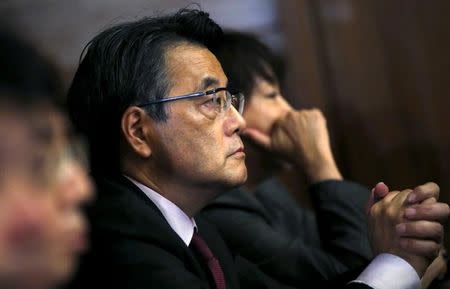Japan opposition parties to merge with eye on July election

By Linda Sieg TOKYO (Reuters) - Japan's biggest and third-largest opposition parties on Friday agreed to merge and reach out to smaller rivals, in what they hope will be a first step towards building an alternative to Prime Minister Shinzo Abe's behemoth Liberal Democratic Party. The merger of the Democratic Party of Japan (DPJ) with the smaller Japan Innovation Party poses no immediate threat to Abe’s ruling bloc, but the LDP’s support is more fragile than recent landslide election wins suggest and polls show many voters would opt for a credible rival if they felt one existed. "We want to respond to the voices of those with anxiety and doubts about the Abe administration," DPJ leader Katsuya Okada told a news conference announcing the merger. The Democrats surged to power for the first time in 2009 but were ousted by Abe's LDP-led bloc three years later, after a reign that left a lasting image of incompetence and infighting.Abe, pledging to end decades of economic stagnation and boost Japan's global profile, has since led his party to two more big elections wins. Many experts, though, attribute his longevity at least partly to voter perception of a lack of a viable alternative. "If there were a unified opposition, the LDP is vulnerable," said Jeffrey Kingston, director of Asian studies at Temple University's Japan campus. In the short-term, the merger, along with proposed election cooperation with the Japanese Communist Party, could also make it harder for the LDP and its allies to win a majority of two-thirds in a July upper house poll needed to tackle Abe's cherished goal of revising the pacifist constitution. The LDP and its junior partner, the Komeito party, won a two-thirds "super-majority" in a December 2014 lower house election, but with record low turnout of about 53 percent. More recently, Abe's voter support, shaken by scandals and gloomy economic news, fell seven points to below 50 percent in a weekend Kyodo news agency poll. More than 35 percent of poll respondents backed no party at all, close to the 38.1 percent supporting the LDP. Changing voting patterns by such independents can produce big swings in election outcomes. With 93 members in the more powerful lower house, the merged party, which is to be formally launched under a new name in March, will still be dwarfed by the LDP, which has 290. Overcoming public memories of the DPJ's perceived failures will be tough, however. "They have to gain competence or a semblance of competence, rather than just change the name," said Sophia University professor Koichi Nakano. Absorbing other small parties will also be vital to success. "It will be meaningful if other parties join in," said Jiro Yamaguchi, a political science professor at Hosei University. (Reporting by Linda Sieg; Editing by Clarence Fernandez)

